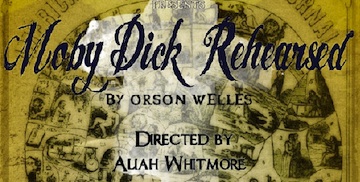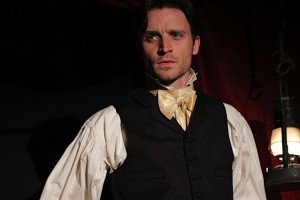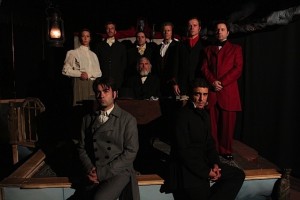A SHOWCASE FOR ORSON WELLES
PROVES DIFFICULT TO REVIVE
Whitmore Eclectic, a non-profit theatre company now in its second season, brings us a presentation of the tricky Moby Dick Rehearsed, Orson Welles’ 1955 theatrical adaptation of Herman Melville’s famous story. In this version, a Nineteenth Century theatre company must adjust to the fact that they are rehearsing the epic tale of Good versus Evil, when they had originally gathered to rehearse King Lear, a device that doesn’t seem worth the effort.
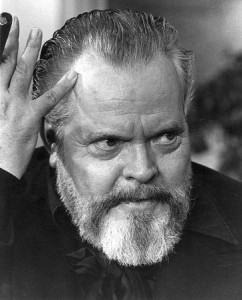 Welles, who took on the lead role when he first presented this interpretation in London in 1955, might have improved his play by sticking with a straight adaptation of the classic novel rather than attempting to create relationships among the actors – roles which are never developed and only delay the real action of the play. This might elucidate why the play only lasted three weeks in London and 13 performances on Broadway (in 1962 with Rod Steiger).
Welles, who took on the lead role when he first presented this interpretation in London in 1955, might have improved his play by sticking with a straight adaptation of the classic novel rather than attempting to create relationships among the actors – roles which are never developed and only delay the real action of the play. This might elucidate why the play only lasted three weeks in London and 13 performances on Broadway (in 1962 with Rod Steiger).
What is extraordinarily odd is that these actors have already memorized Moby Dick, but there is no mention of how this came to be. Despite its title, this is no rehearsal: instead, it comes off like a reading wrapped around a rehearsal inside a performance (at one point, an actor even calls for a line). The active search for the whale in the second act is where this play is most alive and exciting.
It can be surmised that Welles chose sections of the novel more to suit his own theatrical flair than for the pace of the drama; indeed, Welles himself played multiple roles: An Actor Manager, Ahab, and Father Mapple (all played here by James Whitmore Jr. – in this production, the Manager is called The Governor). Interestingly, Welles later filmed a 22-minute version of various scenes from the play, acting all the parts himself.
When a book is modified for the stage or screen it becomes another creature. What reads beautifully in the book may not always work as well in a live performance. The long paragraphs of dialogue are mesmerizing in the novel, but they seem to go on 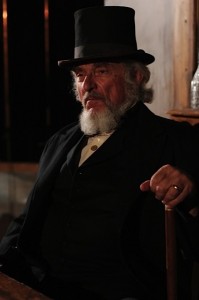 and on in this stage version. Ahab, the mariner bent on revenge against the whale that took his leg, has such long speeches that they diffuse the power necessary to grab the audience and set them up for the impending scenes. When Father Mapple delivers his fire-and-brimstone sermon in this adaptation, it needs to captivate the audience by mesmerizing the sailors on the chapel benches, but the overstuffed length of the speech prevents it from doing so.
and on in this stage version. Ahab, the mariner bent on revenge against the whale that took his leg, has such long speeches that they diffuse the power necessary to grab the audience and set them up for the impending scenes. When Father Mapple delivers his fire-and-brimstone sermon in this adaptation, it needs to captivate the audience by mesmerizing the sailors on the chapel benches, but the overstuffed length of the speech prevents it from doing so.
This performance of Moby Dick Rehearsed brings together a company of veteran actors and new young talent. The entire cast’s commitment to the piece is commendable, but it is the more experienced actors who are better at rising above the obstacles of the script and keeping the action moving along. Among these veteran actors, the convincing Richard Cox (playing Starbuck) and the jocular Tim deZarn (Peleg) light up the stage.
While Dustin Seavey deserves praise for his attempt at handling Ishmael’s difficult descriptive passages, he needs to develop a better vocal level for theatrical performance. His delivery might be fine for film, but his voice drops off at the end of phrases, making it difficult to catch the last words of his sentences – especially in the opening monologue.
Following in the footsteps of Welles and Steiger is certainly daunting for Mr. Whitmore. He takes on the task with courage and bravado, but unfortunately the play’s weaknesses are a hindrance for him, along with the rest of the cast. Whitmore’s performance may have been aided by an extra dose of his own fire and brimstone.
Director Aliah Whitmore demonstrates her cleverness when staging the small whaling boat scenes in the second act, and her choreography of the cast in changing the set pieces keeps the action moving smoothly. Production designer Jacob Whitmore handles the difficulty of this wide and very shallow staging area by adding height on each side of the stage for the crow’s nest and Ahab’s office.
Whitmore Eclectic should be applauded for taking on such a project, as solving the problems in the script would have been difficult for any company. What it needs is more whale and fewer orations.
photos by Robert Fabiani
Moby Dick Rehearsed
Lyric Theatre, 520 N. La Brea Ave.
ends on August 28
for tickets, visit Whitmore Eclectic
